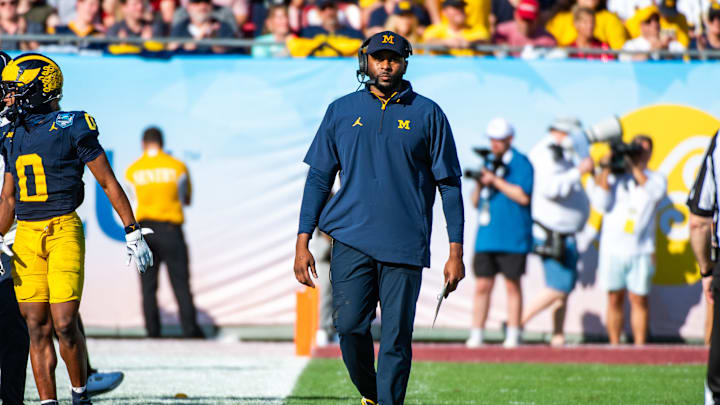When you're in a kangaroo Court, you shouldn't be surprised if the treatment is unfair, which is a great way to describe the treatment the Michigan football program received from the NCAA.
On Friday, the punishments in the Connor Stalions case were finally handed down. Michigan football didn't have any of its wins vacated, as Ohio State fans hoped and predicted. There also wasn't a postseason ban.
Those were the main things Michigan fans wanted to avoid. They got their wish but was the NCAA fair to the Wolverines?
Not even close.
NCAA punishments are too harsh on Michigan football
The investigation had flaws. We'll talk about that in a second, but the punishment didn't fit the crime. Tennessee committed over 100 violations in its recent case. The Volunteers were charged with 18 level-1 allegations, yet paid just an $8 million fine compared to the $20 million for Michigan football despite just six level-1 violations.
Make that make sense. That's probably why Michigan is appealing. The school was only found to have broken minor rules. Advanced scouting, like it or not, is not a level-1 violation. The so-called "cover up" in the eyes of the NCAA was much worse. That's what this punishment is all about.
Michigan didn't cheat. It also didn't cooperate with the investigation; however, knowing what we know about the NCAA, can we really blame Harbaugh and company?
For starters, the NCAA's investigation was dubious. There are credible claims about Michigan, particularly Connor Stalions destorying evidence. However, the NCAA also cites a witness throughout the report, who, at least in one instance, lied to the NCAA.
Student-Athlete 1, as he is called in the NCAA's report, told NCAA investigators that Chris Partridge told him to lie in an interview with the NCAA.
Partridge's exoneration was thorough. Remember, he was fired because the NCAA told Michigan he had spoken to a player about what to say in his interview. Apparently that was based on [Player 1]'s false characterization of the conversation. Partridge had texts, video, & witnesses. pic.twitter.com/qZmeyAXB8q
— Seth M. Fisher 🌹🏆 (@Misopogon) August 16, 2025
However, that was proven false. Partridge had statements from other players, text messages, and video evidence to support his claims. That's why he wasn't punished.
Tim Smith, a longtime UM booster who has denied being the infamous “Uncle T” who some believe funded the Stalions operation, says he was “fully and unequivocally exonerated” in the NCAA’s report released today, per a statement from his lawyers. pic.twitter.com/u1slDqrgRP
— Ross Dellenger (@RossDellenger) August 15, 2025
That's just one lie the NCAA peddled. Another was "Uncle T." The booster (Tim Smith) was exonerated in the final report, even though media reports, after NCAA leaks, suggested he funded the Connor Stalions operation.
The NCAA did do the right thing in the end, but what about the damaging media leaks that tarnished the repuations of both individuals, and Michigan -- when the information was inaccurate?
Tom Mars, Jim Harbaugh's attorney, also accused the NCAA of including falsehoods in the actual report about their communications regarding Harbaugh's personal emails and texts.
Besides all of that, the NCAA hasn't released the third-party firm that provided it with information on Stalions. If that firm has ties to Ohio State, as Michigan believes it does, that should be public.
If there is nothing to hide, what is the NCAA afraid of?
In the end, the penalties are manageable. They shouldn't hinder the progress of the program, but that doesn't make them fair.
